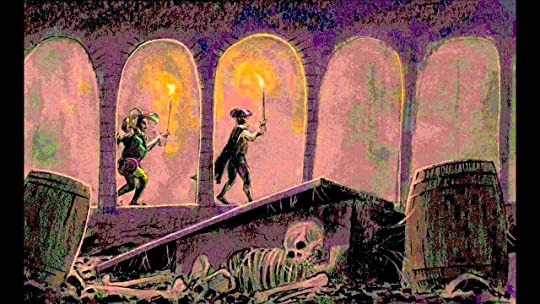Edgar Allan Poe’s “The Cask of Amontillado” is a masterpiece of Gothic literature that has stood the test of time. The story is a perfect blend of allegory, symbolism, irony, and imagery, which creates a sense of horror and terror in the minds of readers. The story is about revenge, murder, and pride, which are recurring themes in Poe’s literary works.
The protagonist and narrator of the story, Montresor, seeks revenge on his wealthy friend Fortunato, who has insulted him many times. Montresor cunningly uses Fortunato’s fondness for wines as an excuse to trap him and ultimately kill him. Montresor uses Luchresi’s name, Fortunato’s contemporary in the connoisseurship of wine, to deceive him into coming with him to taste the Amontillado wine.
They both descend into Montresor’s family vaults, where Montresor chains Fortunato to the stone and begins to wall up the narrow entrance of the crypts to trap him. Fortunato pleads with Montresor to release him, but Montresor ignores his pleas and continues to wall up the entrance. As the last stone is fitted, Montresor plasters the wall, and the jingling of Fortunato’s bell goes silent. Montresor ends the story with the Latin phrase, “Requiescat in pace” or “May he rest in peace.”
The story is rife with themes, such as revenge, deceit, foolishness, hypocrisy, and irony. Revenge is the central theme of the story, as Montresor seeks to avenge himself on Fortunato for the injuries and insults he has suffered. Deceit is also a significant theme, as Montresor cunningly deceives Fortunato into coming with him to the catacombs. Fortunato’s foolishness is shown when he ignores Montresor’s warnings and insists on descending into the damp catacombs. His foolishness ultimately leads to his tragic end.
Hypocrisy is also a theme in the story, as Montresor pretends to be Fortunato’s friend when, in fact, he is his enemy. The irony is also heavily used in the story. Situational irony is seen when Fortunato, whose name means lucky, ironically meets his ill-fated end. Verbal irony is created when Montresor calls Fortunato “my dear” and “lucky” when, in fact, he is neither. Dramatic irony is also present in the story, as Fortunato’s appearance in a jester’s dress depicts that he is going to be ridiculed. Finally, the title of the story, “The Cask of Amontillado,” is also an irony, as Fortunato goes to taste the wine but ends up tasting death.
Conclusion
“The Cask of Amontillado” is a timeless masterpiece that has captured the imagination of readers for generations. Poe’s use of symbolism, allegory, imagery, and irony creates a sense of horror and terror in the minds of readers. The themes of revenge, deceit, foolishness, hypocrisy, and irony make the story a thought-provoking read that leaves a lasting impression. Poe’s literary genius is on full display in this story, making it a must-read for anyone interested in Gothic literature.




1 thought on “The Cask of Amontillado”